- Ngozi Maduoma
- September 24, 2018
- 0 Comments

INTRODUCTION:
 The Most Rev. Benjamin Kwashi, Bishop of the Diocese of Jos and the Archbishop Emeritus of the Ecclesiastical Province of Jos Church of Nigeria Anglican Communion was born in a village called Amper in Plateau State to a Christian family, and his father was a well-respected teacher. He is married to Gloria and they have six children, one of which is also a Priest. He also has about fifty-four orphans living with his family in Jos. Archbishop Kwashi had wanted to pursue a career in the military, but he felt the urge to enter into ministry in 1976. He was ordained an Anglican Priest in 1982 and was sent to serve in several rural and urban Parishes. In 1990, he was the rector of St. Francis Theological College. His Church and Vicarage were totally burned down during the Muslim riot. He became the third Bishop of the newly created Anglican Diocese of Jos in 1992 and in 2008, he was elected Archbishop of the Ecclesiastical Province of Jos, Church of Nigeria Anglican Communion. He has been a leading name in the Anglican re-alignment and at the just concluded GAFCON 3, 2018 in Jerusalem, he was announced as the new General Secretary to replace the Archbishop Peter Jensen, former Archbishop of Sydney.
The Most Rev. Benjamin Kwashi, Bishop of the Diocese of Jos and the Archbishop Emeritus of the Ecclesiastical Province of Jos Church of Nigeria Anglican Communion was born in a village called Amper in Plateau State to a Christian family, and his father was a well-respected teacher. He is married to Gloria and they have six children, one of which is also a Priest. He also has about fifty-four orphans living with his family in Jos. Archbishop Kwashi had wanted to pursue a career in the military, but he felt the urge to enter into ministry in 1976. He was ordained an Anglican Priest in 1982 and was sent to serve in several rural and urban Parishes. In 1990, he was the rector of St. Francis Theological College. His Church and Vicarage were totally burned down during the Muslim riot. He became the third Bishop of the newly created Anglican Diocese of Jos in 1992 and in 2008, he was elected Archbishop of the Ecclesiastical Province of Jos, Church of Nigeria Anglican Communion. He has been a leading name in the Anglican re-alignment and at the just concluded GAFCON 3, 2018 in Jerusalem, he was announced as the new General Secretary to replace the Archbishop Peter Jensen, former Archbishop of Sydney.
Question: Your Grace, please tell us a little about yourself and your background?
Archbishop Kwashi: My name is Benjamin Argak Kwashi. My middle name, Argak means “one way to God.” I was born on the 23rd of September, 1955 and my mother said it was on a Friday morning. I grew up like any other little boy who followed my parents in my growing up days. My father, a C.M.S teacher who was later seconded to government met and married my mother after his first wife died. So, I met him in the days when he had a government land rover attached to him. At about 1960, he realized out that I needed education, so he sent me back to the village to my grandmother and grandfather, and was there for about two years before I started Primary School. Those two years became the most remarkable years that I would live to remember all my life. My grandfather on my mother’s side was the first Anglican Catechist in 1919, in Kabuye. Apparently, I was born in what became the first hospital in Northern Nigeria. Doctor Fox set it up, and died; but it continued for some years after his death, between 1916 and 1921. So, I was born there and that was how I was able to find out later on when I got converted and had a call that it was a background place, where morning prayers were said. While at the village, I towed the bell, because Angers people were like the current Fulani people. We had cows, sheep and goats and so, I had to go shepherding with other kids. It was an experience, because I came to the village with my canvas shoes, clothes and so on; but, my grandma didn’t accept my dressing because everyone else walked around naked. So, the first few weeks was war, but eventually I had to be like other kids who ran after cows, drank milk from the goats, and ate whatever was available. No sensible lizard came around our path, because that was our lunch. We ate only after we had come back in the evening with the animals. Then, my dad came to take me back from my grandparents’ house to put me in Primary School and I finally finished in St. Luke’s Primary School in Jos in 1969, after which I went to Military School in 1970 and was in the set of 1970-1974. Then, I joined the Army and when I got the call from God, I applied for a discharge and I was discharged from supplying transport in Ojo Barracks, Lagos. After Bishop Ogboyemi examined me, he sent me for training in TCNN; then, my life began as a rural evangelist, which was my original call and by 1982, I was ordained. In 1991, I was made a Canon and an Archdeacon and in 1992 I was made a Bishop in Jos. My life has continued on since then and here I am today at 62.
Question: Was there any spectacular occurrence that took place while you were your growing up?
Archbishop Kwashi: While growing up, I was an exceptionally active child; I didn’t know how to do things right and that irritated my mother and if you are a pastor’s daughter like my mother, she was so sure I was going to hell, which helped a lot because I was really at that time ready to go to hell. During my teenage years, she didn’t want to see me and I didn’t want to see her either. She was small in stature, but was a very firm and godly woman. So, when I became born again and returned home, she was shocked because this is a child she had known at 17 years who came home at 19 years, a totally different person. She did not even know how to handle a changed person, because she was always ready for my fight and now, there was none. My dad was amazingly thrilled, in fact he paid my school fees in TCNN, the Church did not. My dad was so grateful to God because according to him, in 1930 when they finished in Wusasa, he was one of the two, late Venerable Mohammed and himself that were sent to St. Andrews, Oyo; but that same year, the Church seconded him to government, so he didn’t get ordained. That was how he went to work in government; so he was thrilled that his dream will come to pass. Then I went to my grandmother to tell her that God was calling me into ministry and since I was 21, I was ready to go into ministry. She said that was no news, because apparently before I was born my mother came home with her first pregnancy, that’s me and my grandfather prayed to the Lord that he wanted a male child who will inherit his ministry. My grandfather’s name is Reverend Gonap, and he did evangelism in his time, planting rural Churches than any other Angers man in history. In fact, when he died people didn’t know he was dead; because he had gone Church planting, evangelizing in a village and then stopped his bicycle to rest on a tree and right there he left to be with the Lord. When it was evening, my grandma came asking for him and we said he was resting; but by then, the man was already gone. He was a well revered man, who was also a prophet and he had prophesied that I will go into ministry. So, those days when my mother went home crying that Benjamin is drunk and lost, my grandmother will say Benjamin will come back. So, when I came back, she went into her room and brought out my inheritance, which my grandfather had left for me and I still have it till date. My inheritance was his Anglican prayer book, which was translated in 1921, his Bible, his two other books and his reading glasses. Also, my grandmother said whenever I was getting married, she had a set of china dishes for whoever I was getting married to. When my grandmother got sick and was hospitalized in Jos, I came to the hospital to see her. But, before I went to the hospital, I went to see Gloria whom I had been trying to convince to say, yes to my marriage proposal. She followed me to see my grandmother and when we got there, my grandmother asked me who she was and I told her to introduce herself. When she introduced herself, I was shocked when my grandmother looked her in the eyes and asked her “Would you marry us?” and she said, “Yes.” Then, my grandmother told me that even if she dies, the wedding must continue. Before this time, I had brought two other girls to my grandmother and she rejected them both. So, these are significant points in my life that I will never forget and I hold them very dear to my heart. I talk about them a lot; even when people visit my office, I showed them the old reading glass, the Bible and the prayer book. Interestingly this year, I also passed them down to my son as our inheritance.
Question: What motivated you back then and what is your advice to the youth, especially teenagers who aspire to be great in life?
Archbishop Kwashi: My generation had no drive for money, because we had a lot of money then that we didn’t know what to do with money. In fact I didn’t know what to do with my over four thousand pounds, so we were wondering what was life all about? And by God’s grace, when we got saved we had people like William Kumuyi and at that time were strong Bible teachers who help young people define themselves in God. That is missing now; so, people are being defined by accomplishments, wealth, media, and so on. But, if a young person does not find God’s will early, he would have gone so far in life before finding out that what he should have been doing was God’s will and by then the years would have been gone and wasted and that is why I am a strong campaigner that those who want to go into ministry should not be over 30 years; because after 30 years, one is married, have plans, the politics, there are so many things in the head and one is not so clear anymore. The cigarette merchants, drug merchants, alcohol merchants catch these children in their teen ages. It is at teen age that the Church needs to invest the definition for young people to find who they are in God and that’s that early age in secondary school before they even go to the university. We were blessed in teen age, but not so blessed in secondary school because I went into the army, which was a great thing. They trained us to like Nigeria, looked after us, paid us salary, bought our shoes etc. That was how we were indoctrinated to believe that we can die for this nation as soldiers. So, that was a career pattern the army succeeded in creating in our lives, but the God part was missing. So, I had failed my NDA exams for the 2nd time before I eventually passed, but God said that it was not it. In fact, I was doing the interviews in Kaduna when the Lord clearly told me to come, so I came out and met my chaplain who recommended me to Bishop Ogboyemi, and that was how I was discharged and taken into ministry. Therefore, it is important for the Church to address these issues with the children. All my six children I have never bothered about what they will become in life, in fact I don’t care if my child fails, having them Godly is better for me than to have a successful idiot who will end up in hell. So, we discussed that with our children and I had a son whose natural penchant was to fail; he just enjoyed failing not that he could not succeed. He would even give people his biro to do their exams until the time was up. So, I begged him to just pass one person at least and he did; and little by little when playfulness left him, he became organized and he picked up. So, it is important for families to find God’s will for their children and what God wants them to be.
Question: One of the issues faced today is peer pressure, how did you cope with it back then and how many of your peers are you still in touch with today?
Archbishop Kwashi: We are only few still alive from my set in secondary school. My class was the class that perished in Ejigbo, in the air crash in 1993, and we lost about more than half of our class. So, we are very few left and we love each other now. Quite a lot made it to generals, we had about 18 generals in my set; so I am in touch with them. Though, they have difficulty calling me My Lord or Your Grace, they still call me my nickname, which I won’t tell you. Then, I have about 5 of my primary school mates in St. Luke’s that are also now in St. Luke’s Cathedral. They are elders, who were not in Church when I became Bishop, but I fished them out. There’s another one who lives in Port-Harcourt, and is a businessman. We meet once in a while and remember our old school days chasing Mango trees in Jos. Jos was beautiful with mango trees and fruits. I think at this age, we ought to look out for each other. What happened to us in our time is different from what is happening now; there was no television, TV came before our own eyes. We had only James Brown and Phillips Morris cigarettes, those were the issues, and Harp, 33, Gulder were born in our time and things were cheap also. There is a difference in the evolution in Nigeria, not for good, but we couldn’t maintain what we had, and we have been losing steadily till date.
Question: For how many years did you serve in the military before your call to ministry?
Archbishop Kwashi: I served fully for two and a half years that is apart from the five years of military school.
Question: At what point did you feel that God was calling you into ministry?
Archbishop Kwashi: I never honestly felt it, because when I became born again in early 76, it was so dramatic and I had a good brother who helped me by the name Brother Dominic Oke. The civil war had just ended and he came with a strong zeal. He was a very quiet man and he was the one who took me to Lagos to buy books. A ship called Logos had berthed and he took me to buy books on growing in Christ. He was a hardened follower of Kumuyi, so he influenced me about Bible Study, staying pure and holiness; he was a Puritan. Interestingly, he was an Anglican too; he was a lay reader, which is why I have no regard for lay readers, who are not evangelizing in the real sense of it; because I was led to Christ by this man, but his education was not as much as mine. So, he knew how to gather people and he would say, Benjamin preach. So, it was from this evening prayer meetings in the barracks that people began to say that this boy would become a preacher. Believe me, my heart was sold out to serving in the army. It took Retired Venerable Sealer who was our first chaplain in the barracks, to pull me into the Church, and made me youth leader. There, I was the first in St. Paul’s Ojoh to buy speakers. I had ideas because I played a little music with my guitar; guitar wasn’t welcome in Church but we did stuffs. I brought musicians to come and play for us. Thus, it was within that context that people began to say we think this boy would become a pastor. So, when Colonel Rev’d Machell came, he began to talk about chaplaincy and I said no that was not my call; I am an infantry soldier, so it is not chaplaincy. But, it was at that point when I went for the NDA interview that I asked for God’s direction and He said to me clearly, “He is calling me to be a Rural Evangelist.” So, I went at that time, processed my papers and I left. I was looking for rural ministry and I found it, because at that time Diocese of Northern Nigeria did not have many clergy and it was vast; so, they would send me. I worked in Norman as a Rural Evangelist, I worked with ECWA EMS- Jerry Buba referred me to Payan Baba, he was then the director of the EMS. I worked in Hausa lands, so by the time I became ordained, I pulled my Church St. Andrew’s to the rural places and eventually, Bishop Ogbayemi put me in Ikara, which was great. I will never forget Ikara ministry; I designed those Churches that are now today’s Cathedrals, it was fascinating. Then, he put me in Zonkwa and I am so glad he removed me because I was so rich in Zonkwa, Gloria had pigs and chickens. Rural life is so fantastic. I am a Bishop, but I must be out in some space with the rural communities.
Question: Can you tell us a little about your wife; who she was then, what she does now and how you both met?
 Archbishop Kwashi: It is a particular part of my life that I like to talk about every day, because when I look at her I always believe God decided to bless me with Gloria. That’s my conviction, because that is what she has been to me. Let me begin from where we are now, none of my children have primary school certificate, she schooled them at home and sent them off to secondary school. Our first experience when we knew that a primary school certificate was required was when our first daughter graduated from medical school, did her housemanship and was going for NYSC, they required her Primary School Certificate. My wife and I were not in the country, we were abroad, so she called and asked for her Primary School Certificate and so, I told her to go to the office and tell Aunty Susan to scribble John Kwashi Memorial Primary School. So, all our children who have been going on NYSC, this has been the pattern. Gloria has been the headmaster, teacher and everything and it is difficult for me to have known what the 23 years old girl I married, the 19 years old girl I saw was going to become in my life. None of our six children has gone to the wind by the way of the devil; it is not credit to me, because she is an amazing teacher. Let me take you back to how we met. I saw a young village girl, honestly that was what she was, and she travelled abroad. She was a young northern girl, she was in a northern fellowship, she was a leader, and the northern church thought she was wonderful. I saw a village girl, because travelling abroad didn’t change this 19 years old girl who came to TCNN. She was still local with no make-up, as a matter of fact she saw my girlfriends. Let me back up a little, my older brother was a pilot with KLM in Lagos, so I grew up virtually in Lagos. You know what eyes can do for a person who knows Lagos girls. So, we were looking for someone flashy and I didn’t see this, plus she knew one of the girlfriends that I had was in UNIJOS. We eventually broke up and that broke my heart. I also went with another one, but my close friend, who is now COCIN Vice-President, said to me, Ben that is your wife and I replied, this one that quarrels with everybody. If you want quarrel just tell Gloria, I love you. So, I said this is a village girl friendship and it does not mean anything, and she fought people in school just for this single case. She is also a fantastic actor; she was the leading actor in the drama we were going to present in UNIJOS and I also write and act plays. We had presented it, and FCS UNIJOS was ready for us to present the play and with just two days to go, she said she was not going anymore. The whole school came to a standstill and she didn’t say the reason for not going and that pained me. So, I sat down and wrote her a nasty letter and I made sure she got it. Apparently, she got it and cried all night with Ann who is a best friend of mine. So, Ann came early the next day to insult me and I told her I would go in the evening to apologize to Gloria and also tell her my mind, because she put us to shame. So cleverly, I went in the evening looking very tidy, because I was students’ President and I didn’t want embarrassment. I went to her looking decent and she asked me if I wrote the letter. I checked it and I told her that I did and she asked why, so I said, Lord this is a chance to tell her the truth. So, I said because I love you. Then, she went back to her room, and I stayed near the door. But, because she was unpredictable, I didn’t know what she was going to do next, so I ran away. Anyways, she wrote a letter to me the next day telling me that she wanted to see me and I prayed to the Lord after my devotion and I said Lord, I will not let this girl say a word. We were in Boys Brigade practice, so I changed the Boys Brigade practice to duties and we started painting so my hands were oily. So, I went to her place and asked her for soap and kerosene to wash my hands and she brought it. I said, thank you Father, and then I asked her for a cup of tea. After finishing the tea, I asked her if she was going for evangelism and she said yes and after that I ran away, I did not let her say one word. I came back later in the evening to ask after her and I still did not give her a chance to say a word. Then I asked my friends to pray; two years before then we all had fights with the girlfriends we thought we would marry, so we went to the mountain to pray and we prayed there every month asking God to give us wives that would be fit for our ministry. There was a time we even took a prayer walk for 72 hours, just begging God, because we knew what God had asked us to do and we were all in our early 20s. We wanted God to give us wives that would carry this ministry with us. Let me tell you the truth, God answered all our prayers. What I was looking for was flashiness and what God was showing me was something else; that village girl she doesn’t express herself much, but after marriage see what God has done in our lives. She is looking after over 400 orphans or vulnerable children with 55 in our house now, because the latest came from the last crisis, an 11 month old baby. She wakes up in the morning to wake everyone up, cooks and looks after everything, studies and she has never earned a salary and doesn’t even want it. In 35 years, she doesn’t know what a salary looks like and yet we have never gone begging. She watches over my back, organizes prayer meetings, women and every other thing. At school, we are normally asked to introduce ourselves by sharing how God called us and I remember this 19 years old girl saying God has called me to work with women and children. It is a calling of my life, which she is fulfilling and she is helping me to fulfill my call.
Archbishop Kwashi: It is a particular part of my life that I like to talk about every day, because when I look at her I always believe God decided to bless me with Gloria. That’s my conviction, because that is what she has been to me. Let me begin from where we are now, none of my children have primary school certificate, she schooled them at home and sent them off to secondary school. Our first experience when we knew that a primary school certificate was required was when our first daughter graduated from medical school, did her housemanship and was going for NYSC, they required her Primary School Certificate. My wife and I were not in the country, we were abroad, so she called and asked for her Primary School Certificate and so, I told her to go to the office and tell Aunty Susan to scribble John Kwashi Memorial Primary School. So, all our children who have been going on NYSC, this has been the pattern. Gloria has been the headmaster, teacher and everything and it is difficult for me to have known what the 23 years old girl I married, the 19 years old girl I saw was going to become in my life. None of our six children has gone to the wind by the way of the devil; it is not credit to me, because she is an amazing teacher. Let me take you back to how we met. I saw a young village girl, honestly that was what she was, and she travelled abroad. She was a young northern girl, she was in a northern fellowship, she was a leader, and the northern church thought she was wonderful. I saw a village girl, because travelling abroad didn’t change this 19 years old girl who came to TCNN. She was still local with no make-up, as a matter of fact she saw my girlfriends. Let me back up a little, my older brother was a pilot with KLM in Lagos, so I grew up virtually in Lagos. You know what eyes can do for a person who knows Lagos girls. So, we were looking for someone flashy and I didn’t see this, plus she knew one of the girlfriends that I had was in UNIJOS. We eventually broke up and that broke my heart. I also went with another one, but my close friend, who is now COCIN Vice-President, said to me, Ben that is your wife and I replied, this one that quarrels with everybody. If you want quarrel just tell Gloria, I love you. So, I said this is a village girl friendship and it does not mean anything, and she fought people in school just for this single case. She is also a fantastic actor; she was the leading actor in the drama we were going to present in UNIJOS and I also write and act plays. We had presented it, and FCS UNIJOS was ready for us to present the play and with just two days to go, she said she was not going anymore. The whole school came to a standstill and she didn’t say the reason for not going and that pained me. So, I sat down and wrote her a nasty letter and I made sure she got it. Apparently, she got it and cried all night with Ann who is a best friend of mine. So, Ann came early the next day to insult me and I told her I would go in the evening to apologize to Gloria and also tell her my mind, because she put us to shame. So cleverly, I went in the evening looking very tidy, because I was students’ President and I didn’t want embarrassment. I went to her looking decent and she asked me if I wrote the letter. I checked it and I told her that I did and she asked why, so I said, Lord this is a chance to tell her the truth. So, I said because I love you. Then, she went back to her room, and I stayed near the door. But, because she was unpredictable, I didn’t know what she was going to do next, so I ran away. Anyways, she wrote a letter to me the next day telling me that she wanted to see me and I prayed to the Lord after my devotion and I said Lord, I will not let this girl say a word. We were in Boys Brigade practice, so I changed the Boys Brigade practice to duties and we started painting so my hands were oily. So, I went to her place and asked her for soap and kerosene to wash my hands and she brought it. I said, thank you Father, and then I asked her for a cup of tea. After finishing the tea, I asked her if she was going for evangelism and she said yes and after that I ran away, I did not let her say one word. I came back later in the evening to ask after her and I still did not give her a chance to say a word. Then I asked my friends to pray; two years before then we all had fights with the girlfriends we thought we would marry, so we went to the mountain to pray and we prayed there every month asking God to give us wives that would be fit for our ministry. There was a time we even took a prayer walk for 72 hours, just begging God, because we knew what God had asked us to do and we were all in our early 20s. We wanted God to give us wives that would carry this ministry with us. Let me tell you the truth, God answered all our prayers. What I was looking for was flashiness and what God was showing me was something else; that village girl she doesn’t express herself much, but after marriage see what God has done in our lives. She is looking after over 400 orphans or vulnerable children with 55 in our house now, because the latest came from the last crisis, an 11 month old baby. She wakes up in the morning to wake everyone up, cooks and looks after everything, studies and she has never earned a salary and doesn’t even want it. In 35 years, she doesn’t know what a salary looks like and yet we have never gone begging. She watches over my back, organizes prayer meetings, women and every other thing. At school, we are normally asked to introduce ourselves by sharing how God called us and I remember this 19 years old girl saying God has called me to work with women and children. It is a calling of my life, which she is fulfilling and she is helping me to fulfill my call.
Question: How long have you been married?
Archbishop Kwashi: For 35 years.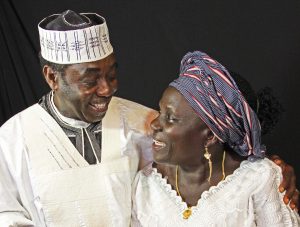
Question: How many dioceses are in the Ecclesiastical province of Jos?
Archbishop Kwashi: 10 Dioceses
Question: How many years did you serve as an Archbishop?
Archbishop Kwashi: 10 Years, I served two tenures.
Question: How have you been able to cope with terrorism in the province of Jos in the past few years?
Archbishop Kwashi: To be honest with you, because we were the guinea pigs in Jos, from 1994 it was classified as a communal clash, by 2001 it was classified as a political clash, then it grew into economic crisis, later to inter-tribal clashes and then, it was defined by the Hausas and others of Plateau. Plateau people do not like Hausa people, was the bad name we were given, so nobody wanted to listen and understand what was really going on in Jos, even the church. The underlying factor about the crisis in Jos was about lands; people sold lands to those who wished to settle and those who settled thought to themselves that they were the owners of the lands, perhaps because they had wealth and influence, they chose to disregard hospitality. While we were growing, we understood it as brotherhood and there was no crisis between a Hausa, Igbo, Yoruba, Angers, Fisere or Bissom person inside Plateau, we lived as brothers and sisters. But, the greed for land and political ascendancy has gravitated the issue and transmuted into violence that we had not seen its kind. It opened doors for people who wanted to explore religious extremism to come in and they exploded the issue, because Jos main market was the first bomb blast that took place in a civilian terrain and during a civilian regime; because now the masquerade has been let out of the room and is now ravaging everywhere. People who were killed on the way from passing through Jos are angry that people from their towns have been killed, people whose shops have been burnt are angry that the Hausa people did it, so all this has opened the door for a near impossible situation, because terrorist has found ground. The main issue is that law collapsed, the inability of the federal, state and local government to exercise law over criminals. Now in Nigeria, Criminal and Criminality are the owners of the land, they are killing anyhow and some are even boasting of killing and nothing happening and mostly they do it and nothing happens. So, we were the guinea pigs in Jos, which now rampaged over North East and we are still living with it, but the Lord has helped us so far.
Question: How did or do the other bishops in other northern dioceses cope with this terrorism?
Archbishop Kwashi: That was how bad it became, because when some moderate Muslims were trying to settle it that this was not about religion, the terrorists had gained ground. So, they split the whole nation into those who are on the side of terrorists and those who are not, it was no more about the Muslims and Christians. If you were not on the side of the terrorists, you were a target and that is what is going on now and the Bishops lost Churches. The researches we conducted showed that the work of the missionary dioceses in establishing indigenous congregations was the biggest testament to the missionary dioceses. Whereas other tribes might say people were killed, the majority of people killed are indigenous Christians who are new converts and their churches destroyed; so the Bishops have been devastated. The Bishops of Damaturu, Maiduguri, Adamawa, Taraba and for us in Plateau, we have been managing in fair bits, but we have conducted far more funerals than naming ceremonies. The best part in leading a traumatized province is that the Bishops are not giving up, we are still doing rural ministration and the best thing I have ever seen is the set of crazy Bishops in the Province of Jos. They are just mad for Jesus.
Question: Do you think that Christians are being persecuted in Nigeria?
Archbishop Kwashi: It is persecution when authorities do or say nothing or even covertly support it and we have seen cases like that in this country. To be honest there is persecution in Nigeria, governments have seen the killing of innocent people, who probably are harmless to anybody but purely because they are Christians they are being killed. There is a hero in Plateau State, an Imam who rescued and kept 300 Christians in his mosque, until security agencies came. This proves my point that if they were Muslims they would not have been killed, but because they were not Muslims. This means that the killers know who to kill, they do not kill or destroy Muslim homes unless they know you are sympathetic to Christians. And the security agencies, why don’t they do anything? So, there is persecution in the land and there is nothing being done about it. There are places in this country where for being a Christian, you don’t exist; you cannot even be a member of the local government, you cannot get some particular appointments. So, there is state sponsored persecution, politically induced and economically induced and so there is persecution, we cannot doubt that.
Question: Have there been any efforts to resolve these issues from the governors of these states in the North? And do they meet with the leaders of the Church?
Archbishop Kwashi: There are some Governors who don’t want to see Christian leaders; I know that because some of the Bishops I have visited never met with the Governor of their states till they left office.
Question: Is it possible that some of the killings happening today receive back up from the government?
Archbishop Kwashi: It would seem to me that it is not far-fetched; because if you look at some of the incidences that occur, for example I know of a case of a killer killing people in their farms and they said, if you are man enough come and get your dead body. They denied people access to the removal of dead bodies. So, the people reported to security agencies and the government, and the government said they could do nothing and when a government does that, it has sponsored terrorism. When a government cannot protect a citizen in danger, then that government is covertly/privately supporting persecution.
Question: You recently posted on your Facebook page about an attack, can you enlighten us on what really happened?
Archbishop Kwashi: That would be the third time that the Fulani would take my cattle. Like I said earlier, growing up as a child I have always had animals, and I would always have them till I die. It is what I use in training my boys and girls, I keep different animals. If you come to my house, it is like a zoo; so it is a part of my life that I live with. About five years ago, they first came through the gate and took over 35 cows with over 60 of my sheep, I reported to the police and they didn’t find them. So, I shifted my pen into a mini ranch, because the Bishop’s court was big then. They came at night, armed and led about 22 of my cows with about 11 of my sheep. Again, I reported to the police and they never found them and the next time, we penned the little ranch in a manner that it was fully covered with our neighbours surrounding, but what surprised us is that this time there was curfew in the state, so nobody was expecting anybody around at the middle of the night and they came again armed, broke my wall and moved them outside on the south-eastern side of the wall. Paul (Adamu) heard footsteps and flashed his light and they shot him dead. Now we got to know that they were armed the second time, because the village head came to thank me that we did not resist, because apparently they had planned for a resistance so they had come with their own armed people to descend on our community. So God averted that, but this one we had a loss of life and God is helping us. We have met with Lydia and her children, we are taking over the children and we are trying to complete the house he was building, so his wife can be kept well for the rest of her life.
Question: What’s your view concerning the herdsmen and cattle rustling issue?
Archbishop Kwashi: Let me tell you that cattle rustling has been on since we were born; cows and goats used to get missing and we knew the king of thieves and you could meet them to report the theft to them and they can find it for you. Cattle Rustling is like every other crime, the point I am making is that if government decides to arrest cattle rustlers, the crime would be reduced, but the arms of government said that “These are not Nigerians so you must learn to live in peace,” these people have come from Chad, Niger or Libya and it is the government that is now producing excuse for criminals. They come and steal your cattle, kill and release the cattle to destroy your farms. So, it would seem like there are people interested in helping criminals; because they are criminals like Evans the kidnapper. I still have Fulani brothers and sisters with whom we grew together in the village and we know thieves; these are not thieves so why is government not getting at the root of the situation. The other issue is that when they steal your cows they have a buyer; no tax on cows, roads, they make money and don’t pay tax themselves, so it is a business that people who sponsor it have a knowledge of the terrain and technical knowledge on military hardware, who have armed this people and unleashed them on us, but I am also confident that evil doesn’t last long, one day the weak would get strong.
Question: Do you support anti-grazing law?
Archbishop Kwashi: Who does this kind of Fulani thing to make money, if you don’t include stealing with it? One rickety cow is about one hundred and twenty thousand naira. What is one hundred and twenty thousand naira if you count 100 cows? It is not money and you can still make the same amount of money because I am a herder and I know what to do with animals and I am so blessed also because my wife is a Fulani. Her uncle lost 200 herds of cows four months ago, so we don’t take them running around, we have farms. We need to educate the Fulani to empower them to do a business that would last. When I was growing up there was a corn beef factory in Bauchi; this are things that we can do, but because some people are completely sold to evil and wickedness, they are not bothered, they want killings to continue as far as it is not their cousins.
Question: With this issue of herdsmen and farmers crisis, what do you advice christians and law abiding citizens who are being persecuted to be doing?
Archbishop Kwashi: When we are been persecuted, we are helpless because you can call the police and army and they wouldn’t do anything. So, at that time you are at the mercy of your killer, some will die but not all will die, because God would save. But, when they have declared war on your people, you need to defend your territory. God has given that authority to man and the constitution of Nigeria has also given that authority to Nigerians; because if the security agencies have failed to provide security, it is mandatory for the community to provide security for themselves, so those are the two lines that we must understand.
Question: Looking at the state of the nation, what’s your own assessment of the three cardinal areas the current administration campaigned on and are currently seeking re-election based on?
Archbishop Kwashi: I don’t know how an Evangelist will answer this question but let me try. I think that when Buhari came into power, he had a clear road map on how to route Boko Haram, but I suspect that it has been sabotaged, because in the last two months the raid of Boko Haram activities has showed that they are alive and well, they have not been decimated as said. They may not be in control of the local government, but they are certainly in control of certain towns and villages from where they operate and they are in control of minds of many young people even 5years old nowadays. They strap them with bomb and send them to the mosque, so they are in control of minds and information. We would have scored this government a hundred percent, but the loss of security personnel has shown a weakness in security information, intelligence and weaponry. Then when you look at the statement of the Governor of Kaduna for example that he went to West Africa to pay the Fulani to stop killing and the killings escalated after paying them. The federal government has not done anything about the Governor of Kaduna or the Fulani, that tells you that apart from Boko Haram, another matter has arisen that is getting sooner than later beyond the control of government. So on security, I think that is a tough one. Then on corruption, the idea of localizing corruption to people who just stole money, it seems okay but doing a theater show for the country, with big men you don’t like who have been arrested when there are other big men also who have not been arrested. So, it has not been entirely clear, there are issues about NYSC certificates, issues about credentials. So, if you are going to fight corruption you need to be holistic not just about money. Corruption is everywhere and we need to deal with it, both as a Church and government needs to partner with the Church. That I think is a bit handicap in that regard, so that is my score. If people are looking for re-election, I would say who would guarantee the security, future and education of my grandchildren, because people like Adebayo Adedeji they planned our lives in my generation, nobody graduated from the secondary school looking for a job; you have bicycle, housing and salary allowance. For those of us in the army, we had about 32 pounds and there was house and food in the barracks; people planned our lives, so I can see people who benefited so much coming now to be plan-less and they are making excuses about Nigeria’s population. There is China, if you plan well the number of children you would have, you would do it. They made excuses for the almajiri, Goodluck gave them a massive amount of money for the almajiris, now there is ghost buildings and the almajiris are back on the road. So, we just had dishonest people, now we are looking for honest people who mean well for the poor. I remember preaching on the Armed Forces Day, I asked the big politicians there if they have ever looked at the photographs of people being killed; they are the poor. How can we be so callous that poor people are being killed, and nobody is screaming? We don’t want leaders like that, we want leaders who protect the poor, provide for orphans and widows, who plans a future for the young ones. So, those are the things I am looking at, I am not looking at tribe or religion. Religion has failed now in politics, they are all the same thing. So, we want people who mean well, people who are not thieves and can implement their policies.
Question: How do people identify this type of leaders?
Archbishop Kwashi: I think I like what I am seeing, there over 100 people who want to be president and nearly 10,000 people want to be governors and senators, so it is good. Prayers are going to go through that, we might not get it right all the time, but we would get some right. Lagos had it right from Tinubu to Fashola to Ambode and Lagos is growing. Port Harcourt in their own fight is paying off because from PDP to APC and now PDP has come back and are trying to impress, that is what politics should be like. So, we need people that would do stuffs to show that they are picking up. Unfortunately, I can’t say this for the North, but people are beginning to say now that there is another way out. If we can build our people, the future would be great, because the resources of Nigeria can only be harnessed by educated people.
Question: Apart from Christians getting their PVC what else should they be doing?
Archbishop Kwashi: There is need for Christian education; on my Facebook page I have published Politics one to eight, and essentially it is guiding people on who and how to vote, and the last one I published, I told them not to allow politicians to tell them what they want to do, they should tell the politicians what they want and if they are not willing, they can leave- you write your aspirations as youths, local governments, ethnic groups. I say this because the Hausas in Jos are far wiser, they sit down discuss and harness their points, but the other ethnic tribes just take it for granted. Everybody must sit down and discuss who they want to vote for and agree within themselves. Politics is wonderful if we all agree, but when there is disagreement you would never get a good leader and unfortunately, Churches also make that mistake of disagreement. We must sit down together and discuss who the best option is. When we pick the best of the best, we secure the future. Lagosians have secured their future.
Question: The vice president blamed men of God for not preaching against corruption, do you agree with him?
Archbishop Kwashi: No, that is what he knows; not all of us have access to the media that he listens to. When I got to Jos, the first thing God asked me to do was to buy several plots of land that was my first assignment for the first 5 years. Some Christians got together, one of them being a Pastor and Catechist, got together and resold my land after getting the documents. So, I arrested them and put them in jail. The Church leaders in Jos came and told me the Bible said Christians should not take fellow believers to court and I said No, you should read the whole text because the same text also says cheats, liars and thieves would go to hell. So, I did not take Christians to jail, I took thieves to jail; because if you steal you stop being a Christian, it doesn’t matter whether you are a Pastor or not, for me you would go to jail. So, if you are Christian do not steal at all. I know that every leadership I have had from the time I was a Catechist, it doesn’t make sense to cheat, fornicate or change figures. He may have blamed them because maybe he wants more of them speaking about it and you know the problem with some of our Pentecostal brothers, when they are sent to leadership. So, it is only the view of Pentecostals they know, they don’t know the view of other Churches. We are doing the right things that he doesn’t know. Honestly, Anglican Church has a system to stop corruption, every year Annual General Meeting, everything is accounted for, if a Bishop or Archbishop is weak, we can help strengthen him but that doesn’t mean that we are not doing it.
Question: What can you say about preachers who focus on seed sowing, without actually questioning where these sowers get their money from?
Archbishop Kwashi: I believe that God raised the Pentecostal Churches in the 70s to raise the older Churches up, because I belong to the generation that was kicked out of the Anglican Church in Lagos and I also believe that there was a great awakening in the 70s that had one single focus to Evangelize the word and that was how several people left the south and was evangelizing, building schools and that was how I got into rural ministry that I enjoy. I believe that it was also cut short down the way, because a new doctrine came in that was self-centered, self-serving and self-promoting and only used Jesus Christ as a pedestal for serving that goal. When that happens and self takes over the limit is unbelievable, so while I would not condemn them I am also happy that it is now happening because I can now say within my own jurisdiction of leadership say to folks this is how people make money is that how you want to do yours? Because the altar of Christianity that has been raised today and is a huge monumental altar is the altar of money and tribe, unfortunately, those are the two bel gods now in the Church. So, it is left for the Church and committed Christians to look at it and demolish it. In my generation, it was the secret society people; so we have to stand, study, read and believe the word of God enough to be able to face it, because I don’t think I am intimidated by money, I don’t need money to preach the Gospel and it is not my motivation to preach the gospel.
Question: What is your stance on same sex marriage?
Archbishop Kwashi:  The point has been made in the last 20years, it is clearly a small demon that would become a big demon eventually unless it is addressed for what it is, same sex marriage is a sin like cheating, lying, beating of wife, fornication, adultery etc., all of those things that we do that does not honor God fall in the same category. It was going to be like a matter that same sex marriage was going to be like the worst of sins, but the danger of same sex marriage is that if we admit same sex marriage we would destroy Genesis 1, 2, 3 and the moment you destroy, you deny those passages, you deny God as a creator and once you deny God the creator, there is no basis for Revelation 21 because then there would be no new heaven and new earth. So, it is that danger that holds within the interpretation of the scripture that made same sex prominent, but as long as we know that the scripture is the authentic, inspired word of God, authority for inspired life, once we hold with that, same sex marriage will have its place but I know about people who were homosexuals and the Lord has saved them; one through our ministry in Jos has 3 children now, so it’s like any other thing that can be saved. My fear now is on youths who are on codeine, drugs and cult, that’s even a bigger issue than same sex marriage in Nigeria now, because those are issues we need to face.
The point has been made in the last 20years, it is clearly a small demon that would become a big demon eventually unless it is addressed for what it is, same sex marriage is a sin like cheating, lying, beating of wife, fornication, adultery etc., all of those things that we do that does not honor God fall in the same category. It was going to be like a matter that same sex marriage was going to be like the worst of sins, but the danger of same sex marriage is that if we admit same sex marriage we would destroy Genesis 1, 2, 3 and the moment you destroy, you deny those passages, you deny God as a creator and once you deny God the creator, there is no basis for Revelation 21 because then there would be no new heaven and new earth. So, it is that danger that holds within the interpretation of the scripture that made same sex prominent, but as long as we know that the scripture is the authentic, inspired word of God, authority for inspired life, once we hold with that, same sex marriage will have its place but I know about people who were homosexuals and the Lord has saved them; one through our ministry in Jos has 3 children now, so it’s like any other thing that can be saved. My fear now is on youths who are on codeine, drugs and cult, that’s even a bigger issue than same sex marriage in Nigeria now, because those are issues we need to face.
Question: Perhaps, there are a few people involved in same sex marriage in Nigeria, what do you think the Church can do about it?
Archbishop Kwashi: The Church as a body needs to adopt a principle and this is the weakness of the Anglican Church. We don’t have a clinical psychology, a Christian pastoral psychology, but my original training in TCNN was pure biblical Christian psychology and I also did clinical psychology, I was one of the founding counselors by the Our Lady of Apostles set up by the Catholic rehabilitation center, so I studied chemical dependencies and its usage and recovery. Now, the Church as Anglican must invest in Christian Pastoral psychology and counselling where you would help people and provide for them to recover, which is a major missing aspect of the Church, because we are very condemnatory and legalistic. I will say that I don’t understand law, I understand grace, if you know how I was saved by Jesus, I was saved by grace and that is why I am looking for sinners and I can work with them, so that patience of psychology that brings out the best of the gospel is missing in the Church. We think that by law people must obey a standard or law and that is what is putting them off, it doesn’t let sinners to come in, but if you understand how to come into a sufferer’s life, you can bring them out. Actually that is the quickest way of evangelism.
Question: Is there need for a rehabilitation center in the Church?
Archbishop Kwashi: Rehabilitation centers are very expensive, they are affordable to those who can afford it, but I know of Redeem having one rehabilitation center, which is a good thing because the Church must do more of that for the young people. Once you allow alcohol, drugs become easy, sex becomes cheap and then violence comes up with it. So, if we as a Church can establish one or two drug rehabilitation centers for young people, these problems are happening, but people think it is not happening. It happens mostly in the middle and lower class. The lower class thrive on cult, who threaten the middle class children who bring money for drugs, so there is a merger between those two in campuses. Unfortunately in Jos, it has gone to secondary schools and also in the bigger cities; they participate in Church activities but are intoxicated most of the times.
Question: What led to GAFCON?
Archbishop Kwashi: I knew when Archbishop Akinola was raising the issues of the Western Churches particularly the US and Canada trying to turn against Scripture. It wasn’t about homosexuality, but it was Western media that hyped up the issue of homosexuality to describe us as homophobic, but that is not the truth. I was there in 1998, when we attended the Lambert Conference, I was a member of the Missions Commission of the Anglican Consultative Council (ACC), 10years before then the Canterbury had passed a decade on evangelism and we were to take reports because in 1995, we had a media review where we took reports on what was going on around the world, but the week we were about to resume in 1998, the Anglican evangelism office was scrapped and this report was not taken up till date. They substituted the movement of evangelism that God was doing as a blessing to the world through the Anglican church with the argument of homosexuality, God helped us, committed Christians, bishops in Australia, Africa, US and UK sat down together in St. Andrew’s and discovered that the issue was about the Bible, it had nothing to do with homosexuality, they wanted the bible thrown out because one of them said men wrote the Bible and said they can rewrite it. So, when the resolution 110 was passed, it upset them and one of the Bishops, John Spong had described Africans as illiterates who were only one mile away from witchcraft in our practice of Christianity and said other worse things, some even boasted of buying us away, so we would start thinking like they were and till today nobody in Lambert Conference has apologized for these types of statements. It is about disregard for Africans, so they are angry that God has looked at our poverty and rewarded us with Church growth and they are now condemning. I have only one I hold on to and that is if the Bible today is giving me a sense of life and direction and helping me to navigate the difficulties of life, if I throw away the Bible what will I have left. We are talking about Fulani Herdsmen and other things in Nigeria and the Bible is the only thing helping me not to get vengeance, angry and to keep pressing on and trusting in the Lord. If I threw away my faith in the word of God what would I have left? In the West, they have good road, health facilities and so on, but what would our children have? So, why would I abandon a God who has given me His word and has helped me navigate these 62 years of my life? So, I fully endorsed and supported Akinola because I am a Biblicist, so Akinola talked to other Bishops and Primates that we should have our own conference separately; and I supported this for another reason, because I went to Lambert 98 that they would hear me, so many testimonies, but they threw that away. So, Lambert is not a place of sympathy, I suffered persecution in Nigeria and also in Lambert for being a black man, I don’t think that is a place I want to be anymore. So, first Lambert held, so we made it clear that this is a fellowship and a movement of God; we cried, prayed, cared for each other as we could because we didn’t have much resources as other Churches had because when it comes to the Bible I am going to heaven, when it comes to the Bible we are all equal- unless you repent you would perish. So that is what gave birth to GAFCON, it is moving and I hope it will continue moving.
Question: The first GAFCON was in Jerusalem, then Kenya and Jerusalem again, is there anything special in Jerusalem?
Archbishop Kwashi: Oh yes, this time around we saw the place, where Peter baptized the 3000; so it is a very special place.
Question: What was your first reaction when you were announced as the general secretary of GAFCON?
Archbishop Kwashi: When the Primate first drew my attention and told me there was a search, one of the things I promised Primate Akinola and the present Primate was that any work of God assigned to me, I would do and it is part of my background training, discipline and being, I do not know how to disobey Godly admonitions. I can argue to understand and some of my Church leaders don’t like me for that. I like being sure, I don’t work with rumor or gossip. So, he told me that he would put my name forward and I was later interviewed and out of those interviewed the Church favored me.
Question: As the general secretary, what do you think would be the next focus of GAFCON?
Archbishop Kwashi: I am laying them before God, I am going to meet Peter Jensen in September to know what is going on. I am going to listen to the Primates; I am a fantastic follower, so I follow good leaders. I believe it would take me more than a year for me to really have a grasp on how GAFCON functions, before I put what I believe God wants me to do.
Question: Does that mean you would move to an office there? If so, how would the diocese of Jos cope?
Archbishop Kwashi: No, there is going to be an office in Abuja by God’s grace, there is also an office in London and there are regional secretaries, so they are going to have their own offices and that is going to make my own work mostly a consultative one. Originally, I have invitations before now up to 2020 of preaching engagements around the world, so it is going to serve GAFCON well that as I am doing my preaching I would be doing my meetings also in different venues around the world.
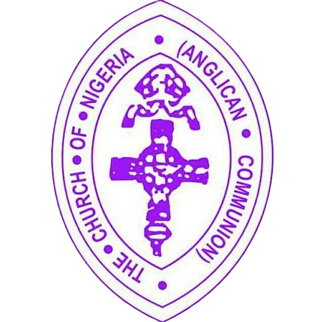

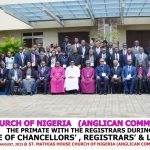
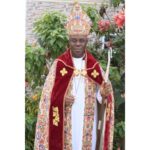
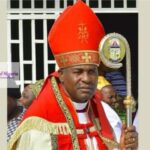
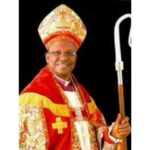
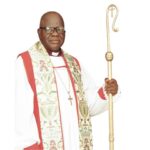
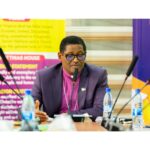

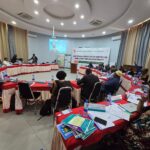
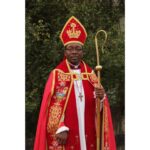
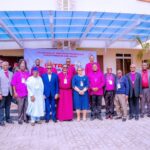
Post Comment